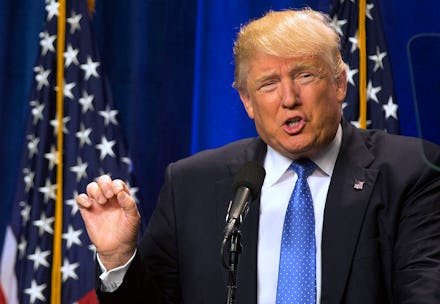Donald Trump Embraces Gays and Gives Muslims the Middle Finger in Speech on Orlando

Donald Trump charged into a muscular defense of his proposed immigration policy — including barring non-U.S. Muslims from entering the country — in a speech that quickly shifted from tones of mourning for the victims of Sunday's Orlando, Florida, nightclub shooting to an indictment of Islamic terrorism and his likely opponent in November, presumptive Democratic nominee Hillary Clinton.
"If we don't get tough and if we don't get smart and fast, we're not going to have our country anymore. There will be nothing, absolutely nothing left," Trump, the presumptive Republican nominee said. "We have no choice."
Read more: Did the Pulse Shooting in Orlando Make a Donald Trump Presidency More Likely?
Trump began his remarks at St. Anselm College in New Hampshire with a softer tone, calling the carnage at the Pulse club "a very dark moment in America's history" and requesting a moment of silence for the victims.
In a prepared speech off which he riffed rather than read, Trump also sought to position himself — versus Clinton — as the greatest defender of gays and lesbians, as he had, to much scorn given his track record, as the stronger champion of women.
"A radical Islamic terrorist targeted the nightclub, not only because he wanted to kill Americans, but in order to execute gay and lesbian citizens because of their sexual orientation," Trump said.
"It's a strike at the heart and soul of who we are as a nation. it's an assault on the ability of free people to live their lives, love who they want and express their identity. It's an attack on the right of every single American to live in peace and safety in their own country."
A hard line: He started tweeting shortly after news of the slayings broke — and came under fire for taking an "I-told-you-so" approach to the tragedy.
His moderate tone Monday lasted just minutes before he tore deeply into current immigration and anti-terror policy, and assailed a potential Clinton administration as a political correctness-fueled disaster for national security.
"We have a dysfunctional immigration system," Trump insisted. "What I want is common sense. I want a mainstream immigration policy that promotes American values."
Having denounced "radical Islam" as a font of anti-woman, anti-gay and anti-American hatred, Trump demanded to know why Clinton would support what he called a torrent of immigration by people who espouse such views.
"Who is really the friend of women and the LGBT community? Donald Trump with actions, or Hillary Clinton with her words?" Trump asked, saying he believed the former would be proven LGBT Americans' best ally — "big league."
During one of his repeated sallies against Clinton and her party, Trump remarked:
"The burden is on Hillary Clinton to tell us why she believes immigration from these dangerous countries should be increased without any effective system to really to screen. We are not screening people... The burden is on Hillary Clinton to tell us why we should admit anyone into our country who supports violence of any kind against gay and lesbian Americans. the burden is on Hillary Clinton to tell us how she will pay for it."
Speaking earlier in Ohio, Clinton called the aftermath of the Pulse murders no time for politics.
Trump apparently felt no such obligation to hold back:
"The LGBT community is just — what's happened to them is just so sad, and to be thinking about where their policies are currently with this administration is a disgrace to that community. I will tell you right now. Clinton wants to allow radical Islamic terrorists to pour into our country. They enslave women and they murder gays. I don't want them in our country."
Trump also urged Muslim communities to "work with us" by identifying radicals to authorities: "I want every American to succeed, including Muslims, but the Muslims have to work with us."
"They know what's going on," Trump said. "They knew the people in San Bernardino were bad, but you know what? They didn't turn them in, and we had death and destruction."
Wrapped in the flag: Often attacked for not being "presidential" enough — thanks to the nit-picking and name calling that flavors his personal Twitter feed — Trump also served up a thick slice of the "America First" rhetoric that's marked his limited foreign policy blueprint to date.
"America must unite the whole civilized world in the fight against Islamic terrorism, just like we did against Communism in the Cold War," Trump said.
This, he also said, meant a renewed focus on the home front: "Our new goal must be to defeat Islamic terrorism, not nation building. No more nation building. It is never going to work — and by the way, we've spent almost $5 trillion over the years on trying to nation build in the Middle East and it has been a complete and total disaster."
Trump, who is just slightly trailing Clinton for the presidency in national polling averages compiled by RealClearPolitics, ended on a soaring note of tolerance and inclusion that stood in marked contrast to where he began his presidential quest almost a year to the day ago — by calling Mexican immigrants "rapists" and drug dealers.
"When I'm president, I pledge to protect and defend all Americans who live inside our borders. wherever they come from, wherever they were born, I don't care," Trump said. "All Americans living here and following our laws, not other laws, will be protected."
Whether Trump's updated post-Orlando sales pitch helps or hurts him in the fight against Clinton for votes, of course, won't be known for sure until November.